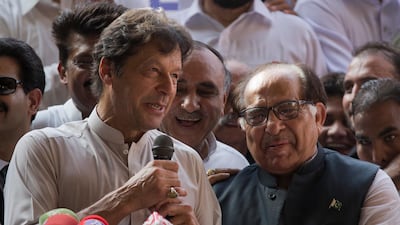The 17th century English philosopher Thomas Hobbes famously described life in the state of nature as “solitary, poor, nasty, brutish and short”. It is an epithet easily applied to Pakistani politics.
Indeed, since independence in 1947, no prime minister has managed to complete a full term in office. Nawaz Sharif, who has governed the country three times, was months away from doing so in July 2017, when he was ousted by the country’s Supreme Court after revelations emerged in the Panama Papers.
On Friday, a court sentenced him to 10 years in prison for corruption; although Mr Sharif was himself banned from seeking office again, the decision is likely to wound his ruling PML-N party, now led by his brother, Shahbaz, ahead of elections on July 25.
From which there is one clear winner: cricketing hero Imran Khan. At times criticised as an attention-grabbing playboy, adored for leading Pakistan to World Cup glory in 1992, Mr Khan has rebranded himself as a pious, corruption-fighting political hopeful. Following Mr Sharif’s sentencing, and after a series of high-profile defections to his TIP party, he is now the favourite to lead one of the world’s most strategically important nations.
Election time in Pakistan is generally characterised by division and fear, with concerns over the influence of the military, which has ruled the country for half of its 70 years since independence.
Nevertheless, there are some indications of a calmer atmosphere. In Pindh province, Sunita Parmar has become the first Hindu to contest provincial assembly elections. Meanwhile, Bilawal Bhutto Zardari, whose mother and grandfather both held Pakistan's highest office, is now campaigning himself for the first time, breathing new life into the race.
Currently polling at 17 per cent, he could become a power-broker. Many see him as a probable coalition partner for Mr Khan, although the two have traded barbs.
If it comes to pass, Mr Khan's coalition will face a host of challenges. The economy, revitalised by military progress against a Tehreek-i-Taliban insurgency, has faltered recently in spite of heavy Chinese investment. Pakistan has been reinstated on the Financial Action Task Force terror watchlist, and faces crunching US sanctions. Meanwhile, a water crisis is looming and vital education and medical infrastructure is in need of renovation. And how Mr Khan deals with the military should he take office will likely set the tone for his tenure. Indeed, many blame Mr Sharif's disagreements with the military establishment for his spectacular downfall.
Power play between the core pillars of state, including the executive, the judiciary and the military have for decades stymied progress and change in Pakistan.
But after two decades of trying, Mr Khan – affectionately nicknamed “Captain” – stands on the threshold of history. Tackling corruption and solving Pakistan’s myriad problems will not be easy. But this is a watershed moment worthy of cautious optimism.

